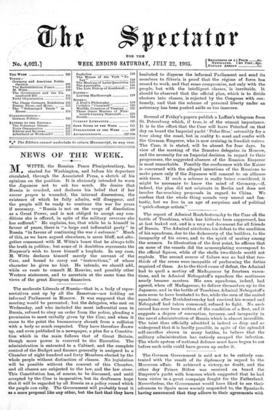The moderate Liberals of Russia—that is, a body of repre-
sentatives sent up by all the Zemstvos—are holding an informal Parliament in Moscow. It was supposed that the meeting would be prevented ; but the delegates, who met on Wednesday, and who included the most influential men in Russia, refused to obey an order from the police, pleading a permission to meet verbally given by the Czar, and when it came to the point the bureaucracy shrank from a, collision with a body so much respected. They have therefore drawn up, and even published in a newspaper, a plan for a Constitu- tion which in the main follows that of Great Britain, though more power is reserved to the Executive. The administration is entrusted to a Cabinet, and the complete control of the Bridget and finance generally is assigned to a Chamber of eight hundred and forty Members elected by the whole people without distinction of classes. No legislation will be possible without the consent of this Chamber, and all classes are subjected to the law, and the law alone. This Constitution has, of course, to be discussed, and until accepted by the Czar is inoperative, but its draftsmen hope that it will be regarded by all Russia as a policy round which the people can rally. The Government will probably treat it as a mere proposal like any other, but the fact that they have hesitated to disperse the informal Parliament and send its members to Siberia is proof that the regime of force has ceased to work, and that some compromise, not only with the people, but with the intelligent classes,' is inevitable. It should be observed that the official plan, which is to divide electors into classes, is rejected by the Congress with con- tumely, and that the scheme of personal liberty under an autocracy has been pushed aside as too insecure.


































